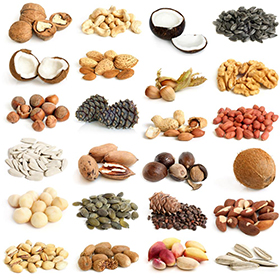
A large amount of evidence has shown a high intake of tree nuts is associated with a reduced risk of cardiovascular disease (CVD), mortality from type 2 diabetes (T2DM), and all-cause mortality.
In this study after 4 weeks on a pecan-rich diet the researchers saw beneficial changes in serum insulin, insulin resistance (HOMA-IR) and beta cell function (HOMA-β) as well as cardiometabolic disease. That is a significant reduction in the risk of diabetes2, heart attacks and stroke.
Cardiovascular diseases (CVD) are a leading cause of death worldwide, and is primarly caused by inflammation and oxidation. Within the past few decades, there has also been a dramatic increase in diet-related chronic diseases related to CVD risk, i.e., diabetes, obesity, and hypertension, in both industrialized and developing nations. The problem is only getting worse even though we spend more money on pharmaceuticals and the medical system than ever before. Increased production of reactive oxygen species, oxidative stress, and inflammation, are the leading causes of type 2 diabetes mellitus (T2DM), arterial hypertension, and dyslipidemia.
A growing body of evidence has shown that a high intake of nuts (all types) is associated with a reduced risk of CVD development, all-cause mortality, and mortality from diabetes. Indeed, a nut-containing diet also contributes to weight control and weight loss despite the large number of calories.
Bioactive compounds present in nuts, include essential fatty acids, vitamins and minerals, fiber, and phytochemicals, have all been shown to reduce inflammation, improving vascular reactivity as well as fasting glucose and insulin sensitivity, and by lowering oxidative stress. Numerous studies have now shown that consumption of nuts is effective in reducing oxidative stress and inflammation. Other studies have shown frequent nut consumption is associated with lower concentrations of inflammation (CRP, IL-6) and some endothelial (the artery lining) markers in clinical trials. In a study of 5,013 participants, a greater intake of nuts was associated with lower amounts of inflammatory biomarkers. Subjects with nut intake of five or more times per week had a 20% nearly 20% reduction in inflammation compared to those who never or almost never consumed nuts. Pistachio nuts, for example, reduce oxidative stress and inflammation. Pistachio kernels have anti-inflammatory and antioxidant properties at lower doses than reported previously and decreased inflammation (TNF-α and IL-1β) in a dose-dependent way. That is, the more the participants consumed, the lower the inflammation.
EAT MORE NUTS
But not peanuts and cashews
For much more information on how to reverse diabetes and cardiovascular disease (and all chronic illness) “Overcoming Illness” our latest book is a must read.
https://www.drdingle.com/collections/frontpage/products/overcoming-illness-pre-order
Source
A Pecan-Rich Diet Improves Cardiometabolic Risk Factors in Overweight and Obese Adults: A Randomized Controlled Trial
Diane L. McKay 1,*, Misha Eliasziw 2, C. Y. Oliver Chen 1 and Jeffrey B. Blumberg 1